HS2041 Enterprise Systems: SAP R/3 ERP Implementation Case Study
VerifiedAdded on 2023/03/21
|9
|1895
|47
Report
AI Summary
This report provides an analysis of a failed SAP R/3 ERP implementation project, examining the reasons behind its failure and the lessons that can be learned. It discusses the purpose and scope of ERP systems, evaluates the implementation approach, and analyzes the role of change management in ensuring successful ERP implementations. The report identifies key factors contributing to the failure of the CORE project, including scope creep, lack of ownership and knowledge transfer, inadequate change management, poor communication, insufficient performance measurement, and the isolation of IT from business affairs. It emphasizes the importance of proper monitoring, performance measurement, and change management for successful ERP implementation. The report concludes that ERP implementation is a costly and time-consuming process that requires careful management and monitoring to increase the likelihood of success. Desklib offers a variety of study tools and resources, including solved assignments and past papers, to aid students in understanding complex topics like ERP implementation.

Running Head: ERP Implementation 0
ERP Implementation
Report
Student name
ERP Implementation
Report
Student name
Paraphrase This Document
Need a fresh take? Get an instant paraphrase of this document with our AI Paraphraser
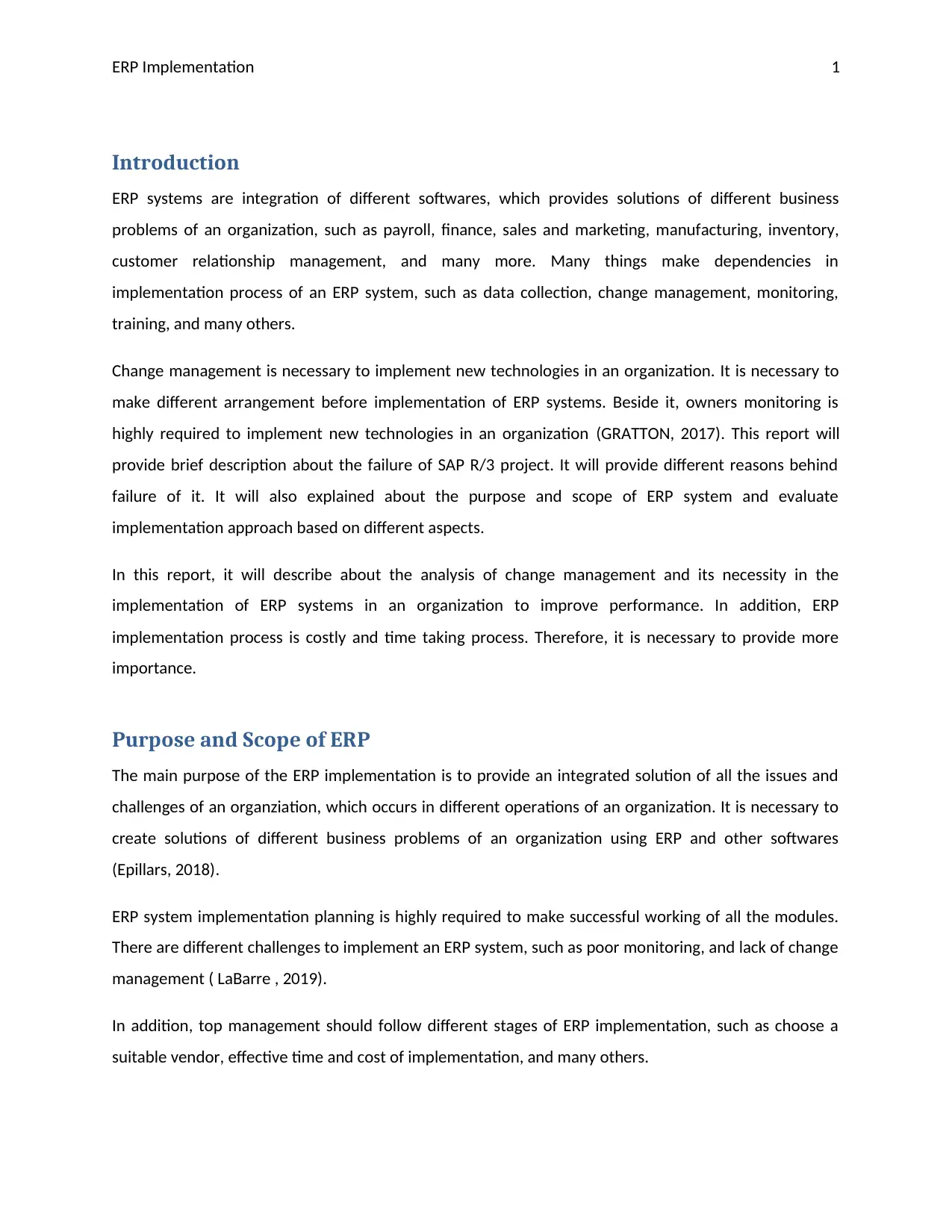
ERP Implementation 1
Introduction
ERP systems are integration of different softwares, which provides solutions of different business
problems of an organization, such as payroll, finance, sales and marketing, manufacturing, inventory,
customer relationship management, and many more. Many things make dependencies in
implementation process of an ERP system, such as data collection, change management, monitoring,
training, and many others.
Change management is necessary to implement new technologies in an organization. It is necessary to
make different arrangement before implementation of ERP systems. Beside it, owners monitoring is
highly required to implement new technologies in an organization (GRATTON, 2017). This report will
provide brief description about the failure of SAP R/3 project. It will provide different reasons behind
failure of it. It will also explained about the purpose and scope of ERP system and evaluate
implementation approach based on different aspects.
In this report, it will describe about the analysis of change management and its necessity in the
implementation of ERP systems in an organization to improve performance. In addition, ERP
implementation process is costly and time taking process. Therefore, it is necessary to provide more
importance.
Purpose and Scope of ERP
The main purpose of the ERP implementation is to provide an integrated solution of all the issues and
challenges of an organziation, which occurs in different operations of an organization. It is necessary to
create solutions of different business problems of an organization using ERP and other softwares
(Epillars, 2018).
ERP system implementation planning is highly required to make successful working of all the modules.
There are different challenges to implement an ERP system, such as poor monitoring, and lack of change
management ( LaBarre , 2019).
In addition, top management should follow different stages of ERP implementation, such as choose a
suitable vendor, effective time and cost of implementation, and many others.
Introduction
ERP systems are integration of different softwares, which provides solutions of different business
problems of an organization, such as payroll, finance, sales and marketing, manufacturing, inventory,
customer relationship management, and many more. Many things make dependencies in
implementation process of an ERP system, such as data collection, change management, monitoring,
training, and many others.
Change management is necessary to implement new technologies in an organization. It is necessary to
make different arrangement before implementation of ERP systems. Beside it, owners monitoring is
highly required to implement new technologies in an organization (GRATTON, 2017). This report will
provide brief description about the failure of SAP R/3 project. It will provide different reasons behind
failure of it. It will also explained about the purpose and scope of ERP system and evaluate
implementation approach based on different aspects.
In this report, it will describe about the analysis of change management and its necessity in the
implementation of ERP systems in an organization to improve performance. In addition, ERP
implementation process is costly and time taking process. Therefore, it is necessary to provide more
importance.
Purpose and Scope of ERP
The main purpose of the ERP implementation is to provide an integrated solution of all the issues and
challenges of an organziation, which occurs in different operations of an organization. It is necessary to
create solutions of different business problems of an organization using ERP and other softwares
(Epillars, 2018).
ERP system implementation planning is highly required to make successful working of all the modules.
There are different challenges to implement an ERP system, such as poor monitoring, and lack of change
management ( LaBarre , 2019).
In addition, top management should follow different stages of ERP implementation, such as choose a
suitable vendor, effective time and cost of implementation, and many others.
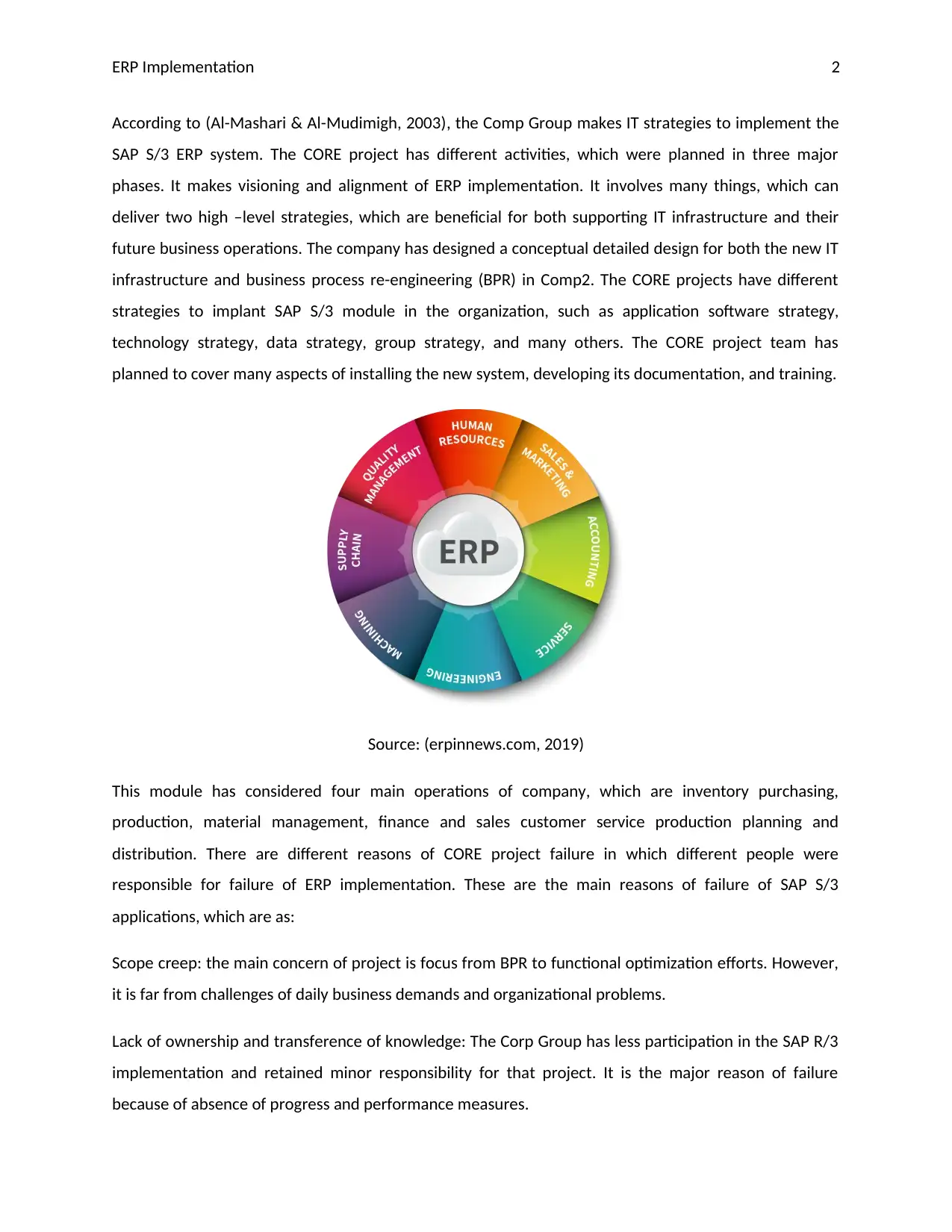
ERP Implementation 2
According to (Al-Mashari & Al-Mudimigh, 2003), the Comp Group makes IT strategies to implement the
SAP S/3 ERP system. The CORE project has different activities, which were planned in three major
phases. It makes visioning and alignment of ERP implementation. It involves many things, which can
deliver two high –level strategies, which are beneficial for both supporting IT infrastructure and their
future business operations. The company has designed a conceptual detailed design for both the new IT
infrastructure and business process re-engineering (BPR) in Comp2. The CORE projects have different
strategies to implant SAP S/3 module in the organization, such as application software strategy,
technology strategy, data strategy, group strategy, and many others. The CORE project team has
planned to cover many aspects of installing the new system, developing its documentation, and training.
Source: (erpinnews.com, 2019)
This module has considered four main operations of company, which are inventory purchasing,
production, material management, finance and sales customer service production planning and
distribution. There are different reasons of CORE project failure in which different people were
responsible for failure of ERP implementation. These are the main reasons of failure of SAP S/3
applications, which are as:
Scope creep: the main concern of project is focus from BPR to functional optimization efforts. However,
it is far from challenges of daily business demands and organizational problems.
Lack of ownership and transference of knowledge: The Corp Group has less participation in the SAP R/3
implementation and retained minor responsibility for that project. It is the major reason of failure
because of absence of progress and performance measures.
According to (Al-Mashari & Al-Mudimigh, 2003), the Comp Group makes IT strategies to implement the
SAP S/3 ERP system. The CORE project has different activities, which were planned in three major
phases. It makes visioning and alignment of ERP implementation. It involves many things, which can
deliver two high –level strategies, which are beneficial for both supporting IT infrastructure and their
future business operations. The company has designed a conceptual detailed design for both the new IT
infrastructure and business process re-engineering (BPR) in Comp2. The CORE projects have different
strategies to implant SAP S/3 module in the organization, such as application software strategy,
technology strategy, data strategy, group strategy, and many others. The CORE project team has
planned to cover many aspects of installing the new system, developing its documentation, and training.
Source: (erpinnews.com, 2019)
This module has considered four main operations of company, which are inventory purchasing,
production, material management, finance and sales customer service production planning and
distribution. There are different reasons of CORE project failure in which different people were
responsible for failure of ERP implementation. These are the main reasons of failure of SAP S/3
applications, which are as:
Scope creep: the main concern of project is focus from BPR to functional optimization efforts. However,
it is far from challenges of daily business demands and organizational problems.
Lack of ownership and transference of knowledge: The Corp Group has less participation in the SAP R/3
implementation and retained minor responsibility for that project. It is the major reason of failure
because of absence of progress and performance measures.
⊘ This is a preview!⊘
Do you want full access?
Subscribe today to unlock all pages.

Trusted by 1+ million students worldwide
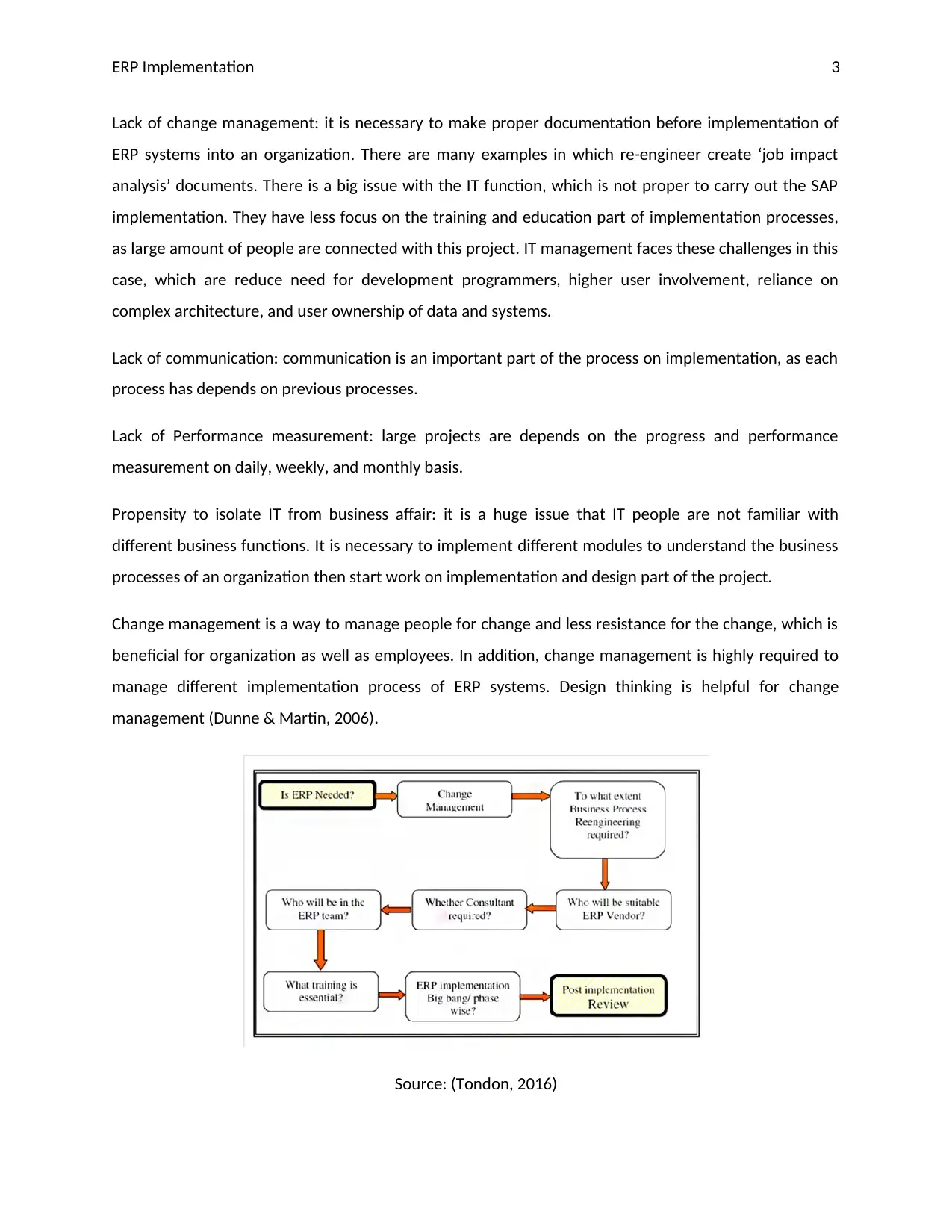
ERP Implementation 3
Lack of change management: it is necessary to make proper documentation before implementation of
ERP systems into an organization. There are many examples in which re-engineer create ‘job impact
analysis’ documents. There is a big issue with the IT function, which is not proper to carry out the SAP
implementation. They have less focus on the training and education part of implementation processes,
as large amount of people are connected with this project. IT management faces these challenges in this
case, which are reduce need for development programmers, higher user involvement, reliance on
complex architecture, and user ownership of data and systems.
Lack of communication: communication is an important part of the process on implementation, as each
process has depends on previous processes.
Lack of Performance measurement: large projects are depends on the progress and performance
measurement on daily, weekly, and monthly basis.
Propensity to isolate IT from business affair: it is a huge issue that IT people are not familiar with
different business functions. It is necessary to implement different modules to understand the business
processes of an organization then start work on implementation and design part of the project.
Change management is a way to manage people for change and less resistance for the change, which is
beneficial for organization as well as employees. In addition, change management is highly required to
manage different implementation process of ERP systems. Design thinking is helpful for change
management (Dunne & Martin, 2006).
Source: (Tondon, 2016)
Lack of change management: it is necessary to make proper documentation before implementation of
ERP systems into an organization. There are many examples in which re-engineer create ‘job impact
analysis’ documents. There is a big issue with the IT function, which is not proper to carry out the SAP
implementation. They have less focus on the training and education part of implementation processes,
as large amount of people are connected with this project. IT management faces these challenges in this
case, which are reduce need for development programmers, higher user involvement, reliance on
complex architecture, and user ownership of data and systems.
Lack of communication: communication is an important part of the process on implementation, as each
process has depends on previous processes.
Lack of Performance measurement: large projects are depends on the progress and performance
measurement on daily, weekly, and monthly basis.
Propensity to isolate IT from business affair: it is a huge issue that IT people are not familiar with
different business functions. It is necessary to implement different modules to understand the business
processes of an organization then start work on implementation and design part of the project.
Change management is a way to manage people for change and less resistance for the change, which is
beneficial for organization as well as employees. In addition, change management is highly required to
manage different implementation process of ERP systems. Design thinking is helpful for change
management (Dunne & Martin, 2006).
Source: (Tondon, 2016)
Paraphrase This Document
Need a fresh take? Get an instant paraphrase of this document with our AI Paraphraser
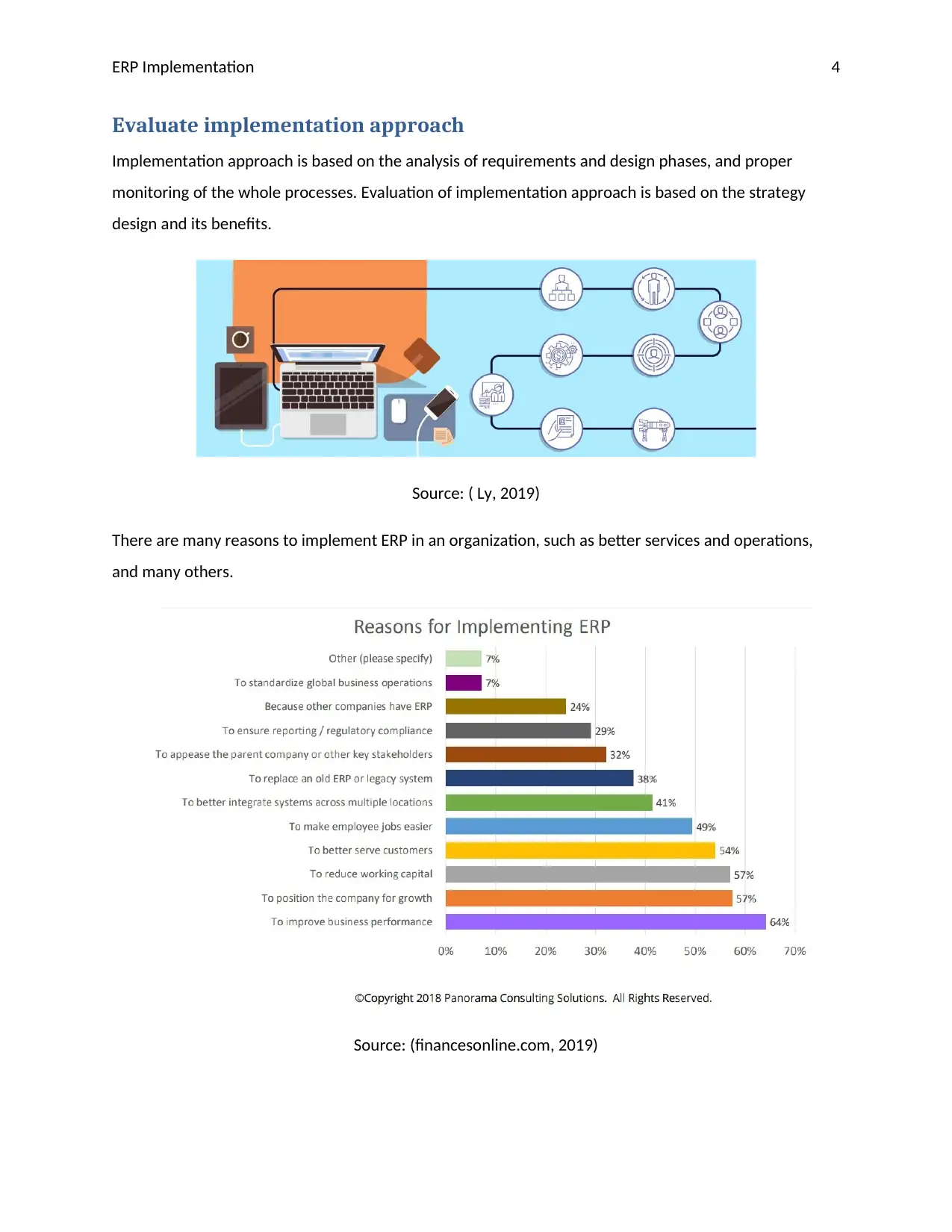
ERP Implementation 4
Evaluate implementation approach
Implementation approach is based on the analysis of requirements and design phases, and proper
monitoring of the whole processes. Evaluation of implementation approach is based on the strategy
design and its benefits.
Source: ( Ly, 2019)
There are many reasons to implement ERP in an organization, such as better services and operations,
and many others.
Source: (financesonline.com, 2019)
Evaluate implementation approach
Implementation approach is based on the analysis of requirements and design phases, and proper
monitoring of the whole processes. Evaluation of implementation approach is based on the strategy
design and its benefits.
Source: ( Ly, 2019)
There are many reasons to implement ERP in an organization, such as better services and operations,
and many others.
Source: (financesonline.com, 2019)
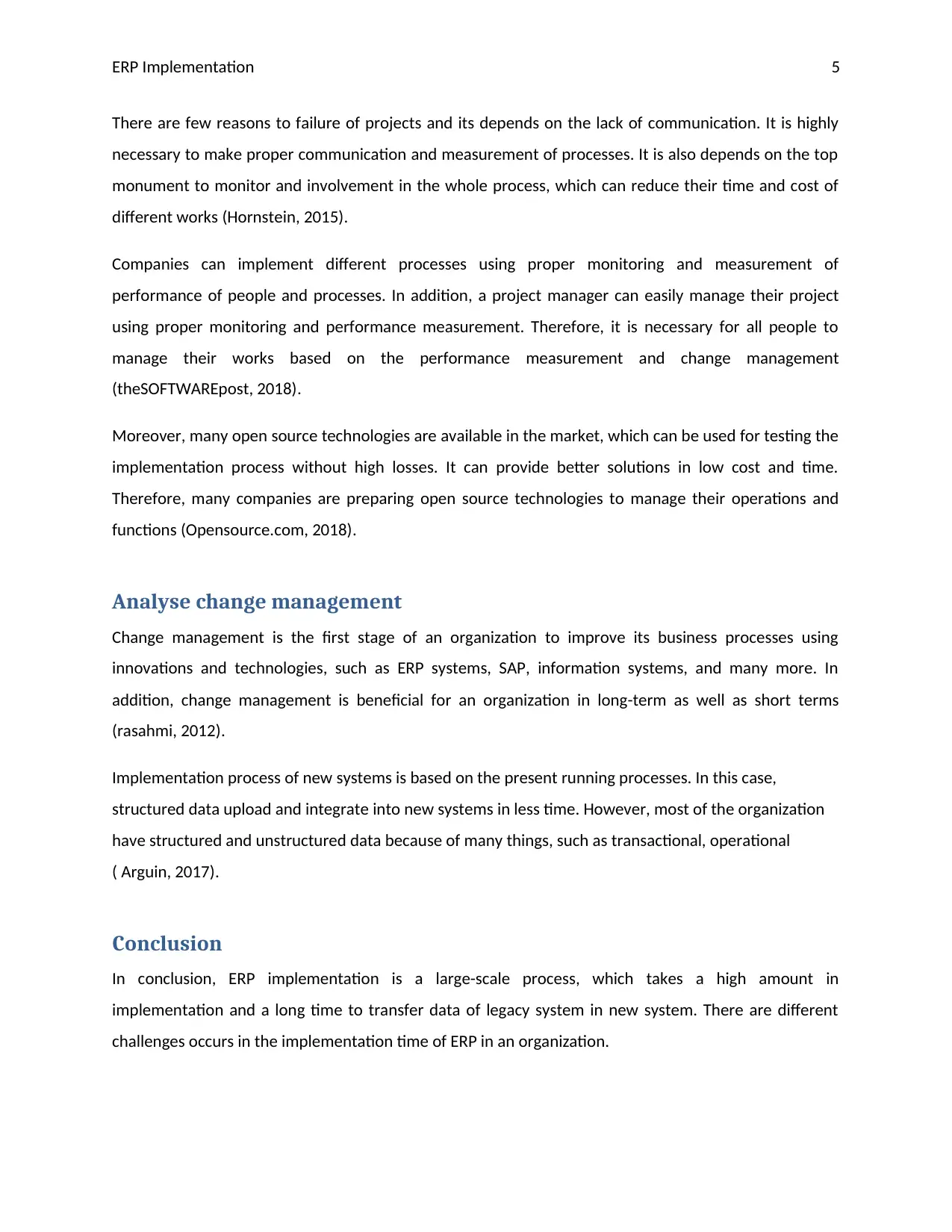
ERP Implementation 5
There are few reasons to failure of projects and its depends on the lack of communication. It is highly
necessary to make proper communication and measurement of processes. It is also depends on the top
monument to monitor and involvement in the whole process, which can reduce their time and cost of
different works (Hornstein, 2015).
Companies can implement different processes using proper monitoring and measurement of
performance of people and processes. In addition, a project manager can easily manage their project
using proper monitoring and performance measurement. Therefore, it is necessary for all people to
manage their works based on the performance measurement and change management
(theSOFTWAREpost, 2018).
Moreover, many open source technologies are available in the market, which can be used for testing the
implementation process without high losses. It can provide better solutions in low cost and time.
Therefore, many companies are preparing open source technologies to manage their operations and
functions (Opensource.com, 2018).
Analyse change management
Change management is the first stage of an organization to improve its business processes using
innovations and technologies, such as ERP systems, SAP, information systems, and many more. In
addition, change management is beneficial for an organization in long-term as well as short terms
(rasahmi, 2012).
Implementation process of new systems is based on the present running processes. In this case,
structured data upload and integrate into new systems in less time. However, most of the organization
have structured and unstructured data because of many things, such as transactional, operational
( Arguin, 2017).
Conclusion
In conclusion, ERP implementation is a large-scale process, which takes a high amount in
implementation and a long time to transfer data of legacy system in new system. There are different
challenges occurs in the implementation time of ERP in an organization.
There are few reasons to failure of projects and its depends on the lack of communication. It is highly
necessary to make proper communication and measurement of processes. It is also depends on the top
monument to monitor and involvement in the whole process, which can reduce their time and cost of
different works (Hornstein, 2015).
Companies can implement different processes using proper monitoring and measurement of
performance of people and processes. In addition, a project manager can easily manage their project
using proper monitoring and performance measurement. Therefore, it is necessary for all people to
manage their works based on the performance measurement and change management
(theSOFTWAREpost, 2018).
Moreover, many open source technologies are available in the market, which can be used for testing the
implementation process without high losses. It can provide better solutions in low cost and time.
Therefore, many companies are preparing open source technologies to manage their operations and
functions (Opensource.com, 2018).
Analyse change management
Change management is the first stage of an organization to improve its business processes using
innovations and technologies, such as ERP systems, SAP, information systems, and many more. In
addition, change management is beneficial for an organization in long-term as well as short terms
(rasahmi, 2012).
Implementation process of new systems is based on the present running processes. In this case,
structured data upload and integrate into new systems in less time. However, most of the organization
have structured and unstructured data because of many things, such as transactional, operational
( Arguin, 2017).
Conclusion
In conclusion, ERP implementation is a large-scale process, which takes a high amount in
implementation and a long time to transfer data of legacy system in new system. There are different
challenges occurs in the implementation time of ERP in an organization.
⊘ This is a preview!⊘
Do you want full access?
Subscribe today to unlock all pages.

Trusted by 1+ million students worldwide
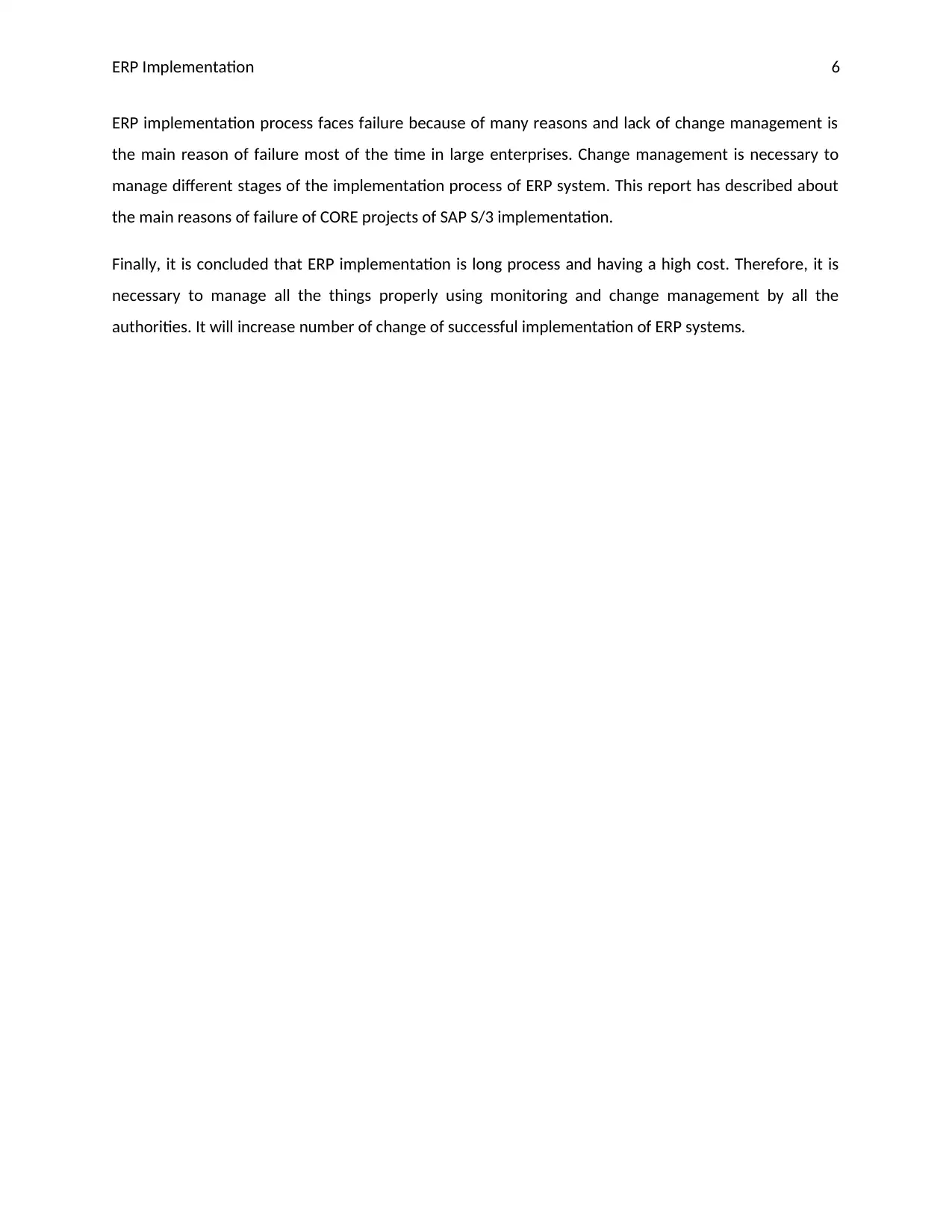
ERP Implementation 6
ERP implementation process faces failure because of many reasons and lack of change management is
the main reason of failure most of the time in large enterprises. Change management is necessary to
manage different stages of the implementation process of ERP system. This report has described about
the main reasons of failure of CORE projects of SAP S/3 implementation.
Finally, it is concluded that ERP implementation is long process and having a high cost. Therefore, it is
necessary to manage all the things properly using monitoring and change management by all the
authorities. It will increase number of change of successful implementation of ERP systems.
ERP implementation process faces failure because of many reasons and lack of change management is
the main reason of failure most of the time in large enterprises. Change management is necessary to
manage different stages of the implementation process of ERP system. This report has described about
the main reasons of failure of CORE projects of SAP S/3 implementation.
Finally, it is concluded that ERP implementation is long process and having a high cost. Therefore, it is
necessary to manage all the things properly using monitoring and change management by all the
authorities. It will increase number of change of successful implementation of ERP systems.
Paraphrase This Document
Need a fresh take? Get an instant paraphrase of this document with our AI Paraphraser
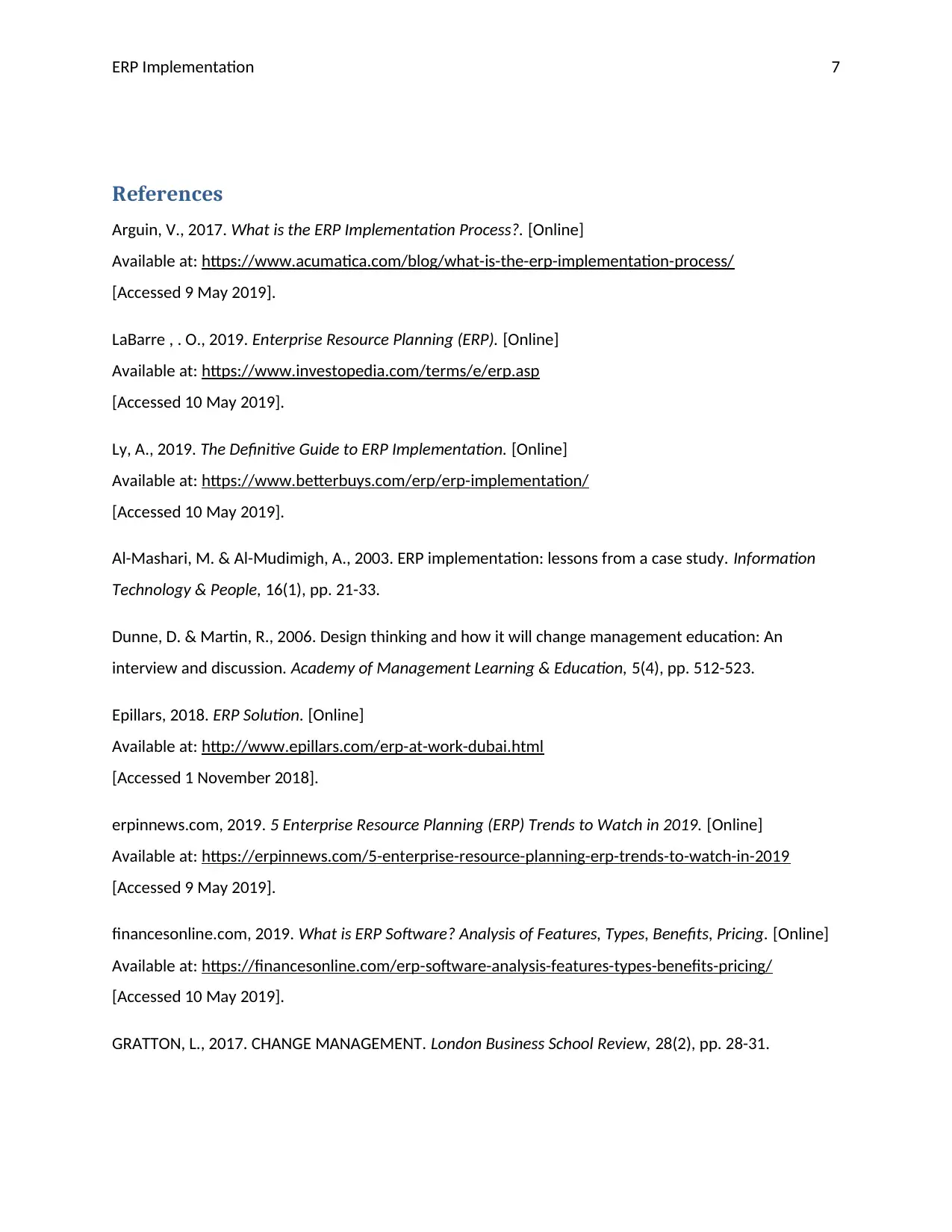
ERP Implementation 7
References
Arguin, V., 2017. What is the ERP Implementation Process?. [Online]
Available at: https://www.acumatica.com/blog/what-is-the-erp-implementation-process/
[Accessed 9 May 2019].
LaBarre , . O., 2019. Enterprise Resource Planning (ERP). [Online]
Available at: https://www.investopedia.com/terms/e/erp.asp
[Accessed 10 May 2019].
Ly, A., 2019. The Definitive Guide to ERP Implementation. [Online]
Available at: https://www.betterbuys.com/erp/erp-implementation/
[Accessed 10 May 2019].
Al-Mashari, M. & Al-Mudimigh, A., 2003. ERP implementation: lessons from a case study. Information
Technology & People, 16(1), pp. 21-33.
Dunne, D. & Martin, R., 2006. Design thinking and how it will change management education: An
interview and discussion. Academy of Management Learning & Education, 5(4), pp. 512-523.
Epillars, 2018. ERP Solution. [Online]
Available at: http://www.epillars.com/erp-at-work-dubai.html
[Accessed 1 November 2018].
erpinnews.com, 2019. 5 Enterprise Resource Planning (ERP) Trends to Watch in 2019. [Online]
Available at: https://erpinnews.com/5-enterprise-resource-planning-erp-trends-to-watch-in-2019
[Accessed 9 May 2019].
financesonline.com, 2019. What is ERP Software? Analysis of Features, Types, Benefits, Pricing. [Online]
Available at: https://financesonline.com/erp-software-analysis-features-types-benefits-pricing/
[Accessed 10 May 2019].
GRATTON, L., 2017. CHANGE MANAGEMENT. London Business School Review, 28(2), pp. 28-31.
References
Arguin, V., 2017. What is the ERP Implementation Process?. [Online]
Available at: https://www.acumatica.com/blog/what-is-the-erp-implementation-process/
[Accessed 9 May 2019].
LaBarre , . O., 2019. Enterprise Resource Planning (ERP). [Online]
Available at: https://www.investopedia.com/terms/e/erp.asp
[Accessed 10 May 2019].
Ly, A., 2019. The Definitive Guide to ERP Implementation. [Online]
Available at: https://www.betterbuys.com/erp/erp-implementation/
[Accessed 10 May 2019].
Al-Mashari, M. & Al-Mudimigh, A., 2003. ERP implementation: lessons from a case study. Information
Technology & People, 16(1), pp. 21-33.
Dunne, D. & Martin, R., 2006. Design thinking and how it will change management education: An
interview and discussion. Academy of Management Learning & Education, 5(4), pp. 512-523.
Epillars, 2018. ERP Solution. [Online]
Available at: http://www.epillars.com/erp-at-work-dubai.html
[Accessed 1 November 2018].
erpinnews.com, 2019. 5 Enterprise Resource Planning (ERP) Trends to Watch in 2019. [Online]
Available at: https://erpinnews.com/5-enterprise-resource-planning-erp-trends-to-watch-in-2019
[Accessed 9 May 2019].
financesonline.com, 2019. What is ERP Software? Analysis of Features, Types, Benefits, Pricing. [Online]
Available at: https://financesonline.com/erp-software-analysis-features-types-benefits-pricing/
[Accessed 10 May 2019].
GRATTON, L., 2017. CHANGE MANAGEMENT. London Business School Review, 28(2), pp. 28-31.
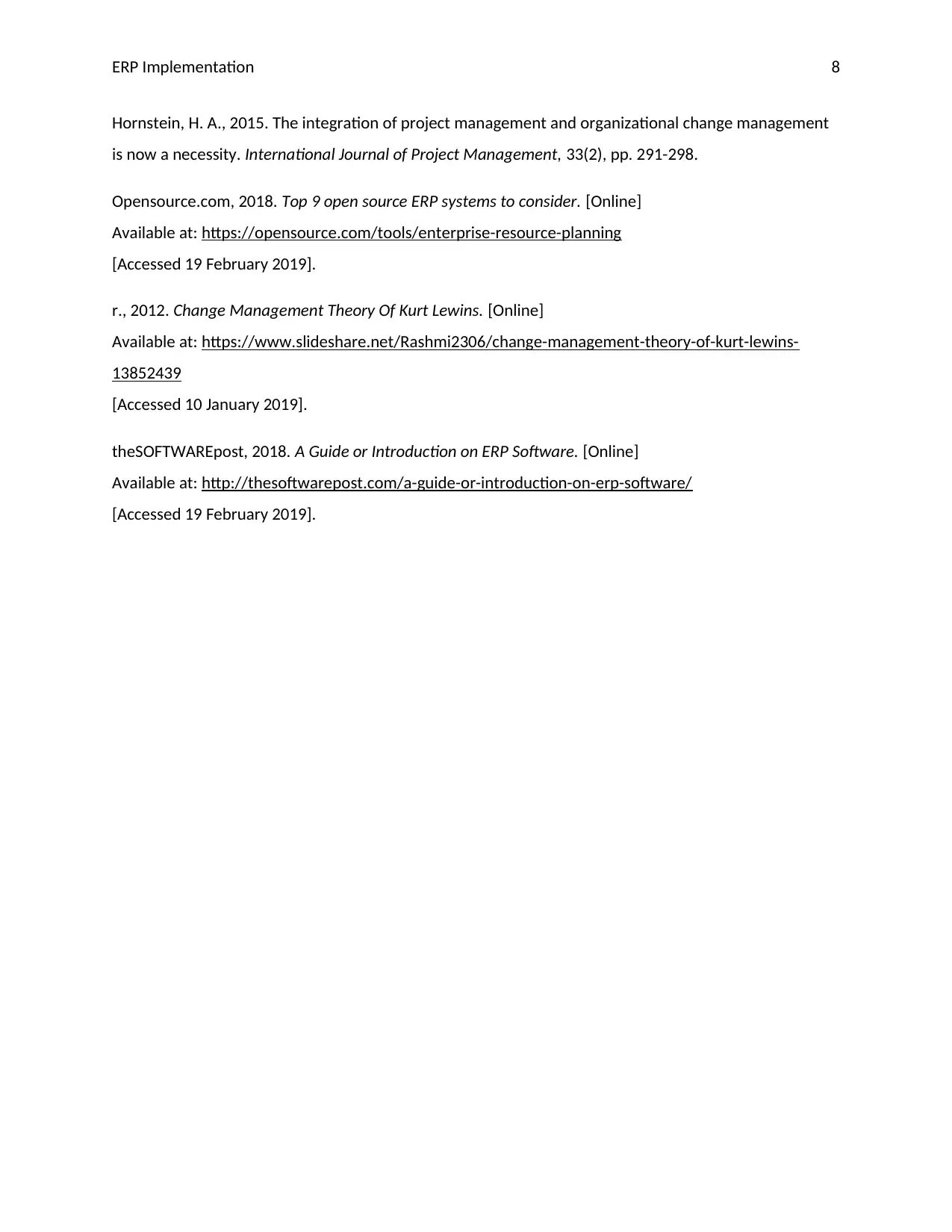
ERP Implementation 8
Hornstein, H. A., 2015. The integration of project management and organizational change management
is now a necessity. International Journal of Project Management, 33(2), pp. 291-298.
Opensource.com, 2018. Top 9 open source ERP systems to consider. [Online]
Available at: https://opensource.com/tools/enterprise-resource-planning
[Accessed 19 February 2019].
r., 2012. Change Management Theory Of Kurt Lewins. [Online]
Available at: https://www.slideshare.net/Rashmi2306/change-management-theory-of-kurt-lewins-
13852439
[Accessed 10 January 2019].
theSOFTWAREpost, 2018. A Guide or Introduction on ERP Software. [Online]
Available at: http://thesoftwarepost.com/a-guide-or-introduction-on-erp-software/
[Accessed 19 February 2019].
Hornstein, H. A., 2015. The integration of project management and organizational change management
is now a necessity. International Journal of Project Management, 33(2), pp. 291-298.
Opensource.com, 2018. Top 9 open source ERP systems to consider. [Online]
Available at: https://opensource.com/tools/enterprise-resource-planning
[Accessed 19 February 2019].
r., 2012. Change Management Theory Of Kurt Lewins. [Online]
Available at: https://www.slideshare.net/Rashmi2306/change-management-theory-of-kurt-lewins-
13852439
[Accessed 10 January 2019].
theSOFTWAREpost, 2018. A Guide or Introduction on ERP Software. [Online]
Available at: http://thesoftwarepost.com/a-guide-or-introduction-on-erp-software/
[Accessed 19 February 2019].
⊘ This is a preview!⊘
Do you want full access?
Subscribe today to unlock all pages.

Trusted by 1+ million students worldwide
1 out of 9
Related Documents
Your All-in-One AI-Powered Toolkit for Academic Success.
+13062052269
info@desklib.com
Available 24*7 on WhatsApp / Email
![[object Object]](/_next/static/media/star-bottom.7253800d.svg)
Unlock your academic potential
Copyright © 2020–2026 A2Z Services. All Rights Reserved. Developed and managed by ZUCOL.




